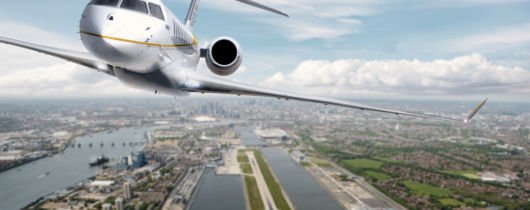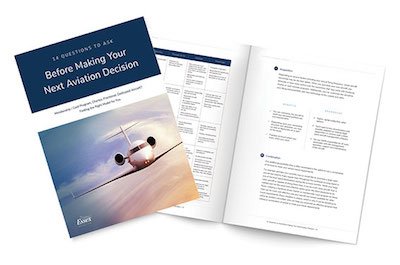
As the global finance industry evolves, more and more banks are turning to corporate aircraft leasing to create new financial opportunities and expand their aircraft portfolios.
The concept is simple enough: Similar to a leasing a car, a bank owns the aircraft and leases it for a predetermined period of time (typically anywhere from 5 to 15 years). The length of the lease, along with other terms and conditions, can have a considerable effect on the settlement of the lease during the termination and aircraft lease return process. Other contributing factors include:
- The amount of annual utilization
- Any modifications made to the aircraft during the lease term
- Repairs made as a result of damage
- Where the aircraft and engines are within the inspection cycle
- The status of components with life-limited or retirement schedules
Both the lessor and the lessee will work to define lease length and other various lease terms and conditions, such as the intended use and operation of the aircraft, during lease agreement negotiations. Two of the most important — yet often ignored — provisions within the lease agreement are the specific return conditions expected of the aircraft and the definition of any maintenance activities and inspections that the lessee needs to complete as part of the return process.
The lease agreement should also define the aircraft specifications, loose equipment and any additional items that must be returned to the lessor. Most lease agreements also mandate that the aircraft be returned with equipment that meets new or current FAA mandates — including equipment that might not have existed when the lease began.
Overseeing a Lease Return
If you are the lender or asset manager of an organization that is in the business of leasing aircraft, consider working with a qualified aviation consultant to manage the asset’s return requirements and ensure that the technical characteristics of the aircraft meets the terms and conditions as defined in the lease agreement. As a lessor, it’s your primary objective to ensure that the aircraft conforms to its intended condition and is well-positioned to be re-leased to another lessee or listed for sale. An independent consultant, such as Essex Aviation, has the proven knowledge and expertise to ensure that your interests are realized, and that there is due diligence and fairness throughout the lease return process. Essex can also help lessors review and identify the optimal aircraft broker to list the aircraft for sale, if needed.
During the lease return process, your consultant will carefully review the lease agreement and evaluate the asset against the terms outlined within that the lease agreement.
Evaluation is typically a four-part process, during which your consultant should do the following:
- Review the aircraft records for continuity and completeness (gaps or missing records will affect the value of the asset).
- Ensure that the aircraft conforms properly to how it was originally certified or has subsequently been modified.
- Review any damage history, special or out of sequence maintenance requirements and methods used for major repairs.
- Represent the lessor’s interest during the lease return inspection and task requirements.
Even a minor issue within an aircraft system — say, for example, a malfunctioning DVD player — can cost your organization thousands of dollars to later repair or replace if it is not identified during the lease return inspection. During the lease return process, your consultant will check for other signs of technical conformity and condition based on the lease agreement, including:
- Whether the Airworthiness Directives and Mandatory Service Bulletins are up to date
- Whether damage events, such as bird impact, ground handling or lightning strikes, occurred, and whether the return to service records are accurate in order to ensure that there are no lingering effects
- Whether modifications (e.g. new equipment) were properly made, including a full review of certification and association records
- Whether any inspections or prorated next inspection costs might be applicable to the lease return conditions based on where the aircraft is within its maintenance cycle
Your consultant will also ensure that any and all work or inspections performed during the lease return process are properly executed and recorded.
An aviation consultant can be particularly helpful to smaller lenders that do not have in-house staff with the available time and (potentially) expertise to conduct a thorough review. Lessors that have older lease agreements will likely require additional negotiations prior to the aircraft return to address open issues that may not be covered. The language used in older lease agreements often tends to be vague, which leaves room for interpretation compared to newer agreements. Often, the two parties will need to recognize and agree on the lease return requirements well in advance of the start of the lease return inspection process. Fortunately, an aviation consultant can work with your asset management team to identify and clarify these terms with the lessee and ensure that your organization maximizes the value of the aircraft upon its return.
The Importance of Continued Support
For some consultants, their involvement ends once the inspection and lease return process are complete. Others, however, will continue to provide quality support and service well after the asset is returned.
Once the aircraft has been returned, banks and lenders will either re-lease the aircraft or choose to sell that aircraft out of their portfolio. If your organization intends to re-lease or sell an asset, consider working with an aviation consultant who can coordinate and manage other industry service providers during the re-marketing process. A truly qualified consultant will partner with you and your preferred aircraft broker for ongoing low utilization storage while it is marketed. Essex Aviation, in particular has assisted lessors with:
- Contracting both long- and short-term hangar space
- Security and record storage
- Contracting of qualified maintenance to keep the aircraft flight ready
- Flight support crew
- On-site technical support and crewing during times the aircraft is shown
The key to finding the right private aviation consultant is to look for one backed by a team with years of industry experience and proven dedication to its clients. If you would like to speak to an experienced consultant who can provide unbiased advice and assist your organization with lease return management, contact the experts at Essex Aviation today.







